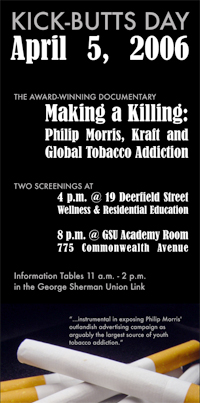Cigarettes stink
BU takes a stand against tobacco companies during Kick Butts Day.

On Wednesday, April 5, BU students will be among young people from across the country showing tobacco companies that they are tired of being targeted through marketing and campaign ads. The 11th annual Kick Butts Day, sponsored by the Campaign for Tobacco-Free Kids, celebrates activism against tobacco use, products, and companies.
Beth Grampetro, health and wellness educator for the Office of Residence Life, has spearheaded the event on campus. She will man an information table in the George Sherman Union Link from 11 a.m. to 2 p.m. to discuss the advertising tactics tobacco companies use to lure potential young smokers. Grampetro also will host two screenings of the documentary Making a Killing: Philip Morris, Kraft, and Global Tobacco Addiction, a half-hour film exposing the aggressive advertising tactics used to hook children on tobacco and spread tobacco addiction internationally. The film will be shown at 4 p.m. at the Wellness and Residential Education office at 19 Deerfield St. and again at 8 p.m. in the GSU Academy Room at 775 Commonwealth Ave.
“We want to expose the fact that even though tobacco companies legally can no longer advertise on television and radio in the United States, they still have their shady ways of getting their products across to young people,” says Grampetro. “Big tobacco companies get their names out through ads disguised as antitobacco campaigns. They were able to circumvent the advertising restrictions placed on them by making these do-good ads.”
Grampetro cited a 2002 study that revealed that Philip Morris’ youth antismoking ads actually increase the likelihood that kids will pick up the habit in the future. The research, featured in the American Journal of Public Health, showed that nonsmoking 12 to 17 year olds were more likely to say that they intend to smoke in the future after being exposed to Philip Morris’ “Think. Don’t Smoke” ads. Viewing the ads made them feel less threatened by tobacco companies and their products.
According to the Campaign for Tobacco-Free Kids, 20.9 percent of high school students in Massachusetts smoke and 9,500 young teens become regular smokers every year. In addition, tobacco use kills 8,900 Massachusetts residents annually and costs the Commonwealth $3.3 billion in health-care bills. The Federal Trade Commission has found that tobacco companies spend more than $15.4 billion a year to market their products in the United States, according to the Campaign for Tobacco-Free Kids, which is the equivalent to spending $42 million a day. In Massachusetts, tobacco companies spend $233 million a year to market their products.
Kick Butts Day is important for college students as well, Grampetro says, because they are still influenced by their peers, a great number of whom smoke. She says that it’s also a unique event because everyone has a stake in its success.
“During the Great American Smoke-Out it’s hard to get the attention of people who don’t smoke,” says Grampetro. “But with this event, even if you don’t smoke, you are affected because the tobacco companies are doing these things to target your younger brothers and sisters.”